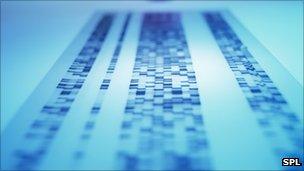Unravelling the epigenome
- Published
- comments

More than ten years on, patients and their relatives might be forgiven for wondering whatever happened to the health care dividend promised by the cracking of the human genome?
At the time, world leaders, lead by President Bill Clinton, vied to come up with superlatives to match the occasion in an unprecedented live transatlantic celebration of what he described as a stunning and humbling achievement.
"It will revolutionise the diagnosis prevention and treatment of most, if not all, human diseases."
The truth is that the Human Genome Project has, and continues, to deliver a vast range of vital insights into our understanding of the mechanisms underpinning disease, but also that those mechanisms have turned out to be more complicated than many people realised.
One of the key areas where that added complexity has shown its hand is in the chemical instruction manual overlaying the genetic code: the epigenome. And it's this overarching instruction manual, dictating how and when individual genes switched on or off, that's causing so much excitement in biomedical research.
So much so that the European Commission's Health Research Division has announced plans to invest some 30m euros in research that aims to improve our understanding of the human epigenome, the Blueprint Project.
"The Blueprint Project is a follow-up to the Human Genome Project," says Stephan Beck, the professor of medical genomics at UCL, and a lead researcher involved in the programme. "That gave us the location of all the genes in our genome. But now we want to understand how these genes work, how they work differently in different tissues, and how they are involved in different diseases."
The vital role epigenetics plays in disease is the focus of a new book, The Epigenetics Revolution, by Pfizer's Dr Nessa Carey. Until recently she says we hadn't appreciated how important these mechanisms were, or what happened when they went wrong.
"That's been the big breakthrough in the last few years," she says, "starting to understand the molecular mechanisms behind this exquisitely tightly controlled set of chemical modifications to our genes, and what happens when those controls sometimes go wrong".
The good news is that, despite this extra layer of complexity, fixing epigenetic problems that trigger disease - developing new drugs and treatments to correct faulty or damaged epigenetic programming - may prove easier than targeting the genes themselves.
If that's true then the health care dividend promised at the turn of the millennium may turn out to have been delayed rather than cancelled.